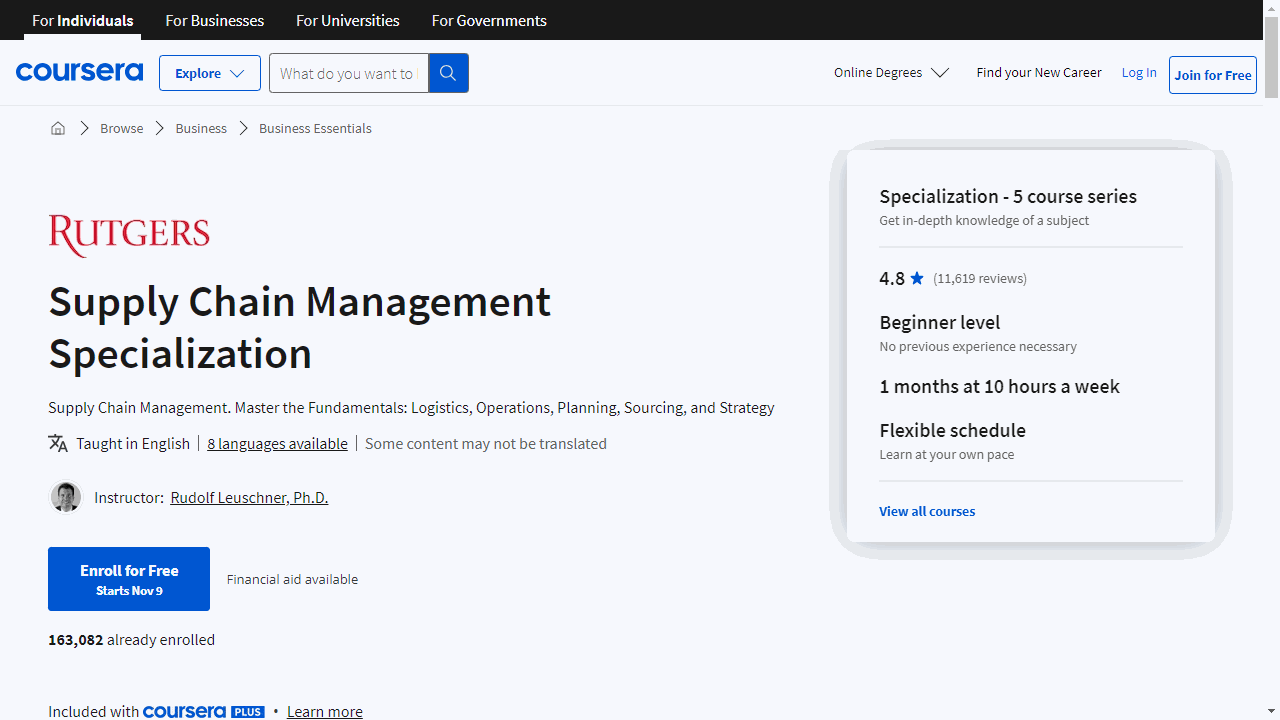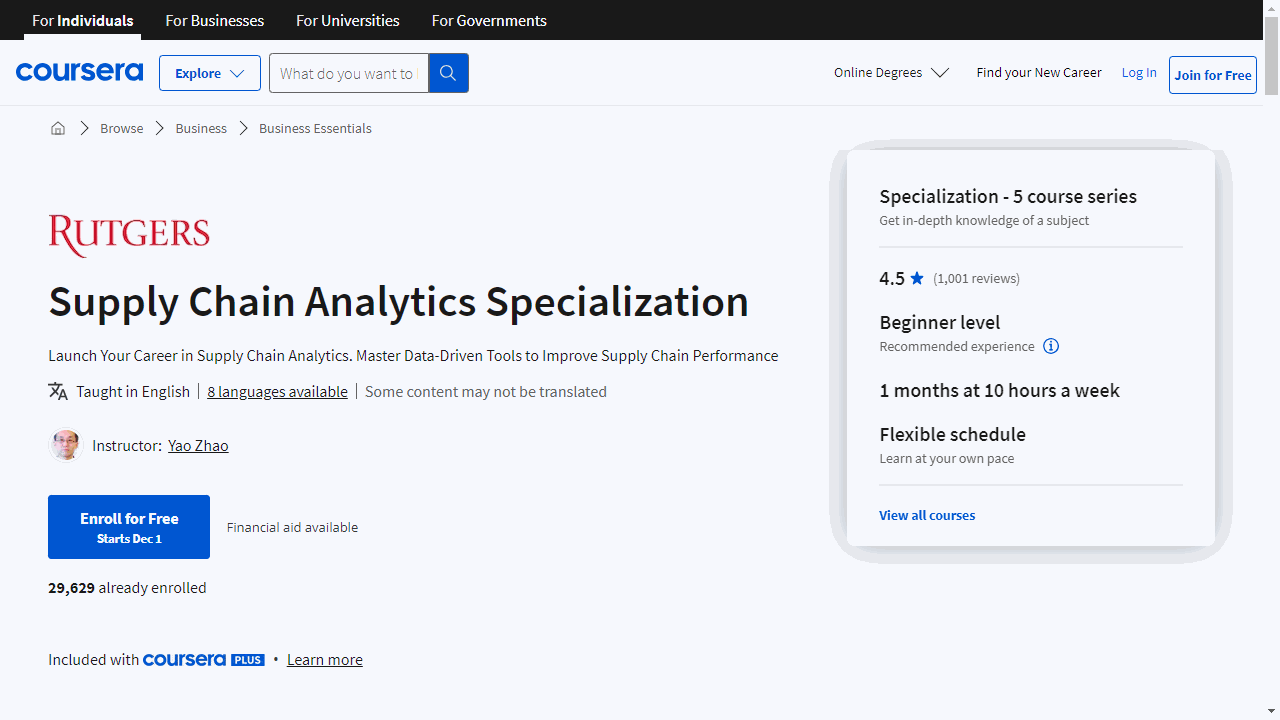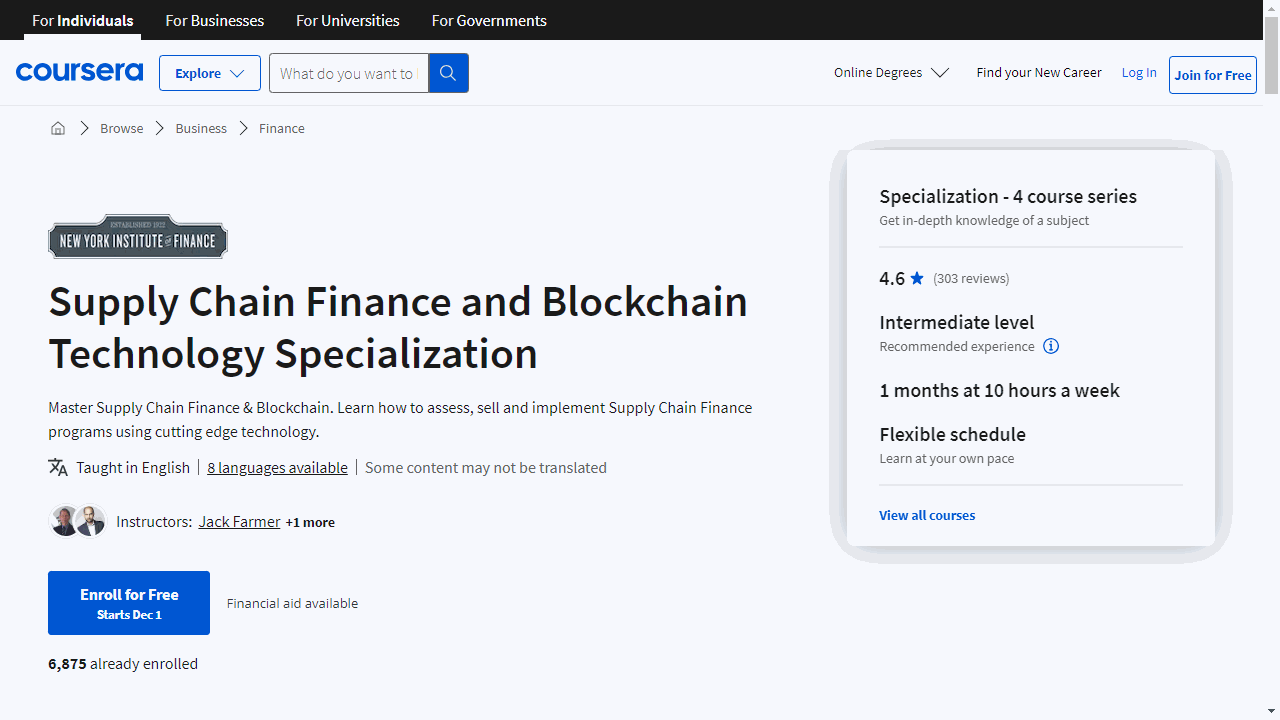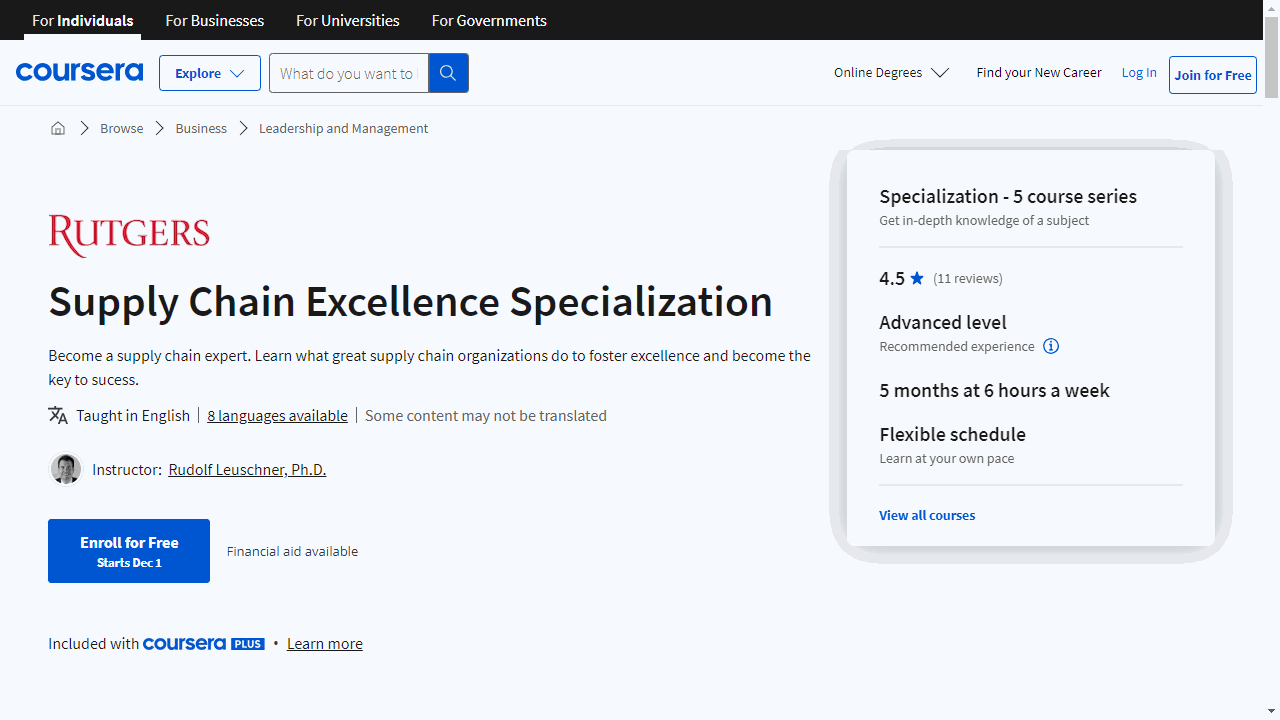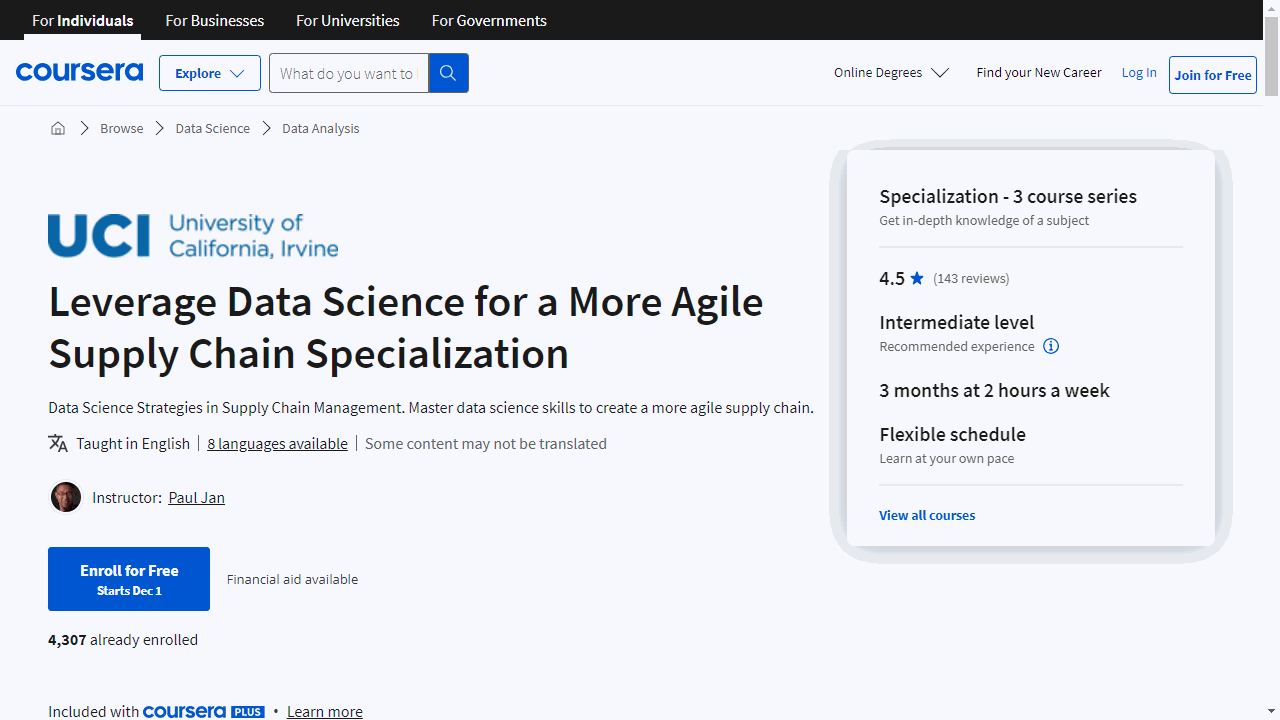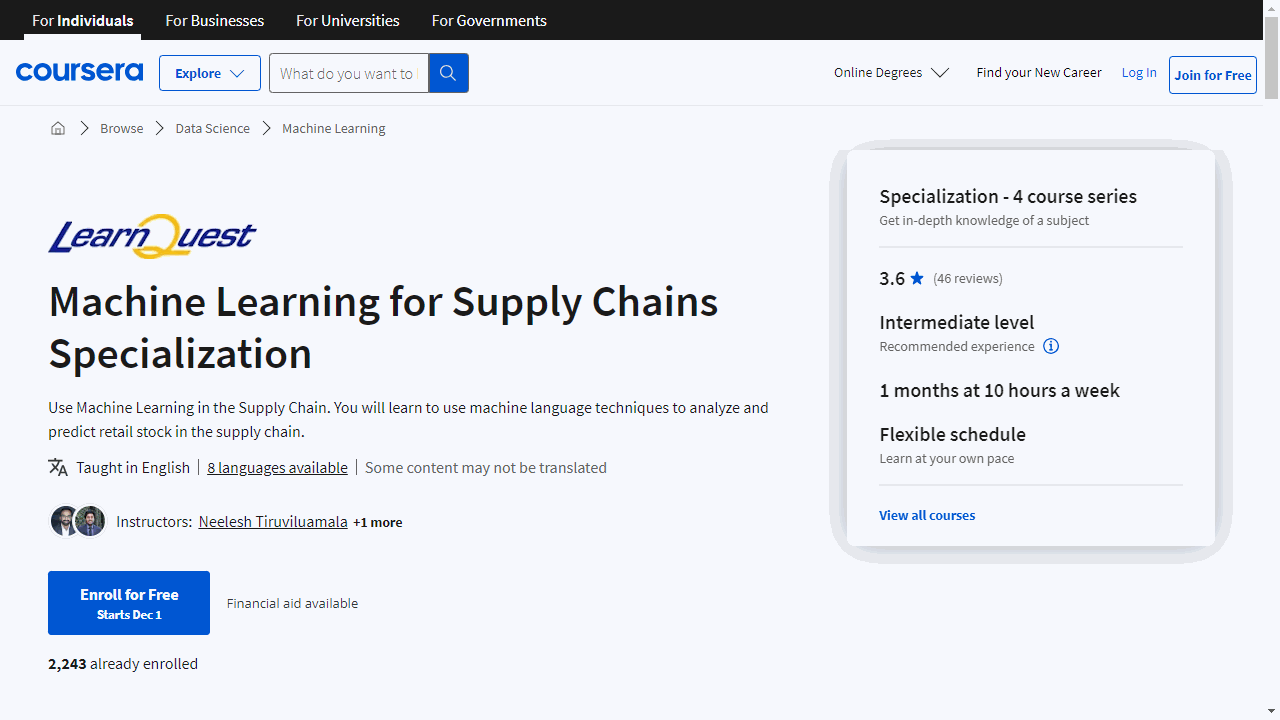Supply chain management is the process of planning, organizing, and managing the flow of goods and services from the point of origin to the point of consumption.
It encompasses every aspect of a product’s journey, from raw materials sourcing to delivery to the end customer.
A well-managed supply chain can lead to reduced costs, increased efficiency, and improved customer satisfaction.
Learning about supply chain management can be crucial for anyone seeking to work in logistics, operations, or even entrepreneurship.
Finding the right supply chain course on Coursera can be overwhelming, with so many options available.
You want a program that’s comprehensive, engaging, and taught by experts, but also fits your learning style and goals.
We recommend the Supply Chain Management Specialization from the Rutgers University as the best overall supply chain course.
This specialization offers a deep dive into the world of supply chain management, equipping you with the skills needed to navigate and optimize the flow of products, information, and finances.
It covers a broad range of topics, from logistics and operations to sourcing and supply chain strategy.
The program features high-quality lectures, real-world case studies, and interactive quizzes, making it an ideal choice for those seeking a comprehensive understanding of this critical field.
While this specialization is a great starting point, there are many other excellent supply chain management courses available on Coursera.
Keep reading to explore our recommendations tailored to different learning levels and career goals.
Supply Chain Management Specialization
This series of courses is designed to equip you with the essential skills needed to navigate and optimize the supply chain, a critical component of any business operation.
The journey begins with “Supply Chain Logistics,” where you’ll gain insight into the delivery of goods from origin to consumer.
This course breaks down the logistics landscape, covering transportation, warehousing, and inventory.
You’ll learn to evaluate transportation options, design efficient warehouses, and manage inventory effectively.
This foundational course is accessible even if you’re new to the field, though a basic grasp of business concepts will help you hit the ground running.
Moving on to “Supply Chain Operations,” you’ll delve into the processes that ensure consistent production quality.
The course introduces you to Six Sigma and Lean methodologies, empowering you to identify and eliminate waste, thereby enhancing operational efficiency.
A familiarity with spreadsheets and the concepts from the logistics course will serve you well here.
In “Supply Chain Planning,” the focus shifts to the art of balancing supply with demand.
You’ll master various forecasting methods to inform a Sales and Operations Plan, ensuring that production levels are in tune with market needs.
This course is particularly valuable for those looking to avoid the pitfalls of overproduction or stock shortages.
“Supply Chain Sourcing” takes you into the realm of supplier management.
You’ll learn to navigate the supplier selection process and develop strategies for effective supplier segmentation.
You’ll be equipped to establish and maintain productive relationships with suppliers, a key aspect of any robust supply chain.
The specialization culminates with “Supply Chain Management Strategy,” a capstone course that challenges you to apply your newfound knowledge to real-world scenarios.
Here, you’ll demonstrate your ability to craft comprehensive supply chain strategies, integrating the tools and techniques from the preceding courses.
From forecasting and strategic sourcing to risk management, you’ll emerge with a well-rounded understanding of how to make a supply chain efficient and responsive.
Supply Chain Analytics Specialization
This suite of courses is designed to equip you with the analytical skills needed to excel in the supply chain sector.
The journey begins with “Supply Chain Analytics Essentials,” where you’ll grasp the significance of analytics in supply chain management and its economic impact.
This course doesn’t just teach theory; it prepares you for the job market, offering tools to pinpoint job opportunities and make informed career choices.
In “Business Intelligence and Competitive Analysis,” you’ll delve into the role of data in understanding market dynamics and company positioning.
It’s a practical approach to business intelligence, empowering you to perform competitive analysis with the precision of a seasoned consultant.
“Demand Analytics” introduces you to the intricacies of demand forecasting.
By analyzing real-world scenarios, you’ll learn to predict and influence demand, a skill that directly correlates with revenue growth and cost reduction.
“Inventory Analytics” tackles one of the most critical aspects of supply chains—inventory management.
You’ll discover how to identify and address inventory challenges, ensuring product availability while minimizing excess and waste.
Lastly, “Supply Chain Analytics” offers a comprehensive view of optimizing supply chain performance.
You’ll explore strategies to balance cost efficiency with customer satisfaction, gaining hands-on experience in integrated supply chain and logistics planning.
Each course is rich with relevant skills—data analysis, competitive benchmarking, inventory control, and more—positioning you to make an immediate impact in the field.
Supply Chain Finance and Blockchain Technology Specialization
The specialization begins with “Introduction to Supply Chain Finance & Blockchain Technology,” where you’ll unravel the fundamentals of supply chain finance and discover blockchain’s role in reshaping the industry.
You’ll learn to assess and enhance working capital, and understand the dynamics of implementing supply chain finance solutions.
Moving on to “Key Success Factors in Supply Chain Finance,” the course hones in on the practical aspects of creating successful financing programs.
It covers customer identification, program pricing, and supplier engagement strategies, ensuring you can conduct thorough pre-sales and supplier analyses.
“Supply Chain Finance Market and Fintech Ecosystem” expands your perspective, providing insights into market size, growth, and the key players.
This course prepares you to navigate the market with an understanding of the various funding sources and trends that could impact the future of supply chain finance.
Lastly, “Future Development in Supply Chain Finance and Blockchain Technology” propels you into the technological advancements shaping the industry’s future.
You’ll explore the implications of AI, APIs, and Distributed Ledger Technology, gaining foresight into how these innovations can be applied within supply chain finance.
Throughout the specialization, you’ll acquire targeted skills such as risk management, blockchain implementation, and financial innovation.
This curated learning path not only deepens your understanding of supply chain finance but also positions you to leverage blockchain technology effectively.
Supply Chain Excellence Specialization
This specialization, designed by Rutgers University, is tailored to provide a deep dive into the intricacies of supply chain management, equipping you with the skills to navigate and optimize the flow of products, information, and finances.
The foundational course, “Supply Chain Excellence,” sets the stage by offering a comprehensive overview of the supply chain’s critical components.
You’ll tackle complex problem-solving and logistics strategy, engaging with peers and faculty to solidify your understanding.
In “Sourcing Excellence,” the focus shifts to the inbound logistics, where you’ll dissect sourcing strategies and financial flows.
The course culminates in a capstone case study, allowing you to apply your knowledge to a real-world context.
“Operations Excellence” hones in on the internal workings of supply chains.
Here, you’ll master Lean Six Sigma principles and operations management, preparing you to streamline processes and enhance efficiency within an organization.
“Logistics Excellence” explores the outbound logistics, providing insights into strategic sourcing and procurement.
You’ll learn to navigate logistics information systems and finance, ensuring products reach their destination effectively.
The specialization rounds off with the “Supply Chain Excellence Capstone,” where you’ll synthesize all you’ve learned.
This final project challenges you to develop strategies for product and information flows, demonstrating your ability to leverage the supply chain for financial success.
Leverage Data Science for a More Agile Supply Chain Specialization
Navigating the complexities of supply chain management requires a solid grasp of planning, inventory control, and optimization.
The “Leverage Data Science for a More Agile Supply Chain Specialization” on Coursera is tailored to equip you with these essential skills.
In “Supply Chain Planning,” you’ll delve into the intricacies of matching demand with supply using data science.
This course empowers you to analyze and forecast demand accurately, leveraging Excel to transform historical data into actionable insights.
You’ll emerge with the ability to fine-tune supply chain operations for efficiency and responsiveness.
“Inventory Management” focuses on the strategic role of inventory in maximizing profits and minimizing waste.
You’ll master the art of setting optimal inventory levels, even in the face of uncertainty, using Excel and the newsvendor model.
This course ensures you can maintain service quality while keeping costs in check.
Lastly, “Supply Chain Optimization” offers a deep dive into streamlining operations.
You’ll learn to frame and solve optimization problems and apply Monte Carlo simulations to mitigate risks, all within Excel.
This course culminates in a comprehensive approach to creating a resilient, agile supply chain.
Machine Learning for Supply Chains Specialization
This series of courses is designed to equip you with the skills needed to analyze and optimize supply chains using machine learning.
The journey begins with “Fundamentals of Machine Learning for Supply Chain,” where you’ll master data manipulation using Python’s powerful libraries, Numpy and Pandas.
Even if you’re new to the field, the course is structured to build your understanding from the ground up, culminating in solving optimization problems with Linear Programming.
As you progress to “Demand Forecasting Using Time Series,” you’ll delve into the intricacies of time series analysis, essential for accurate demand prediction.
You’ll construct ARIMA models and set the stage for advanced forecasting methods, all within the Python ecosystem.
The specialization then takes a deep dive with “Advanced AI Techniques for the Supply Chain,” where you’ll explore sophisticated machine learning paradigms.
From neural networks to random forests, you’ll learn to apply these techniques to real-world supply chain challenges, including image classification for quality control.
The capstone project, “Predicting Safety Stock,” is where theory meets practice.
You’ll harness SARIMA models to forecast product usage and determine safety stock levels, integrating lead time calculations for a comprehensive approach to inventory management.
Also check our posts on:
